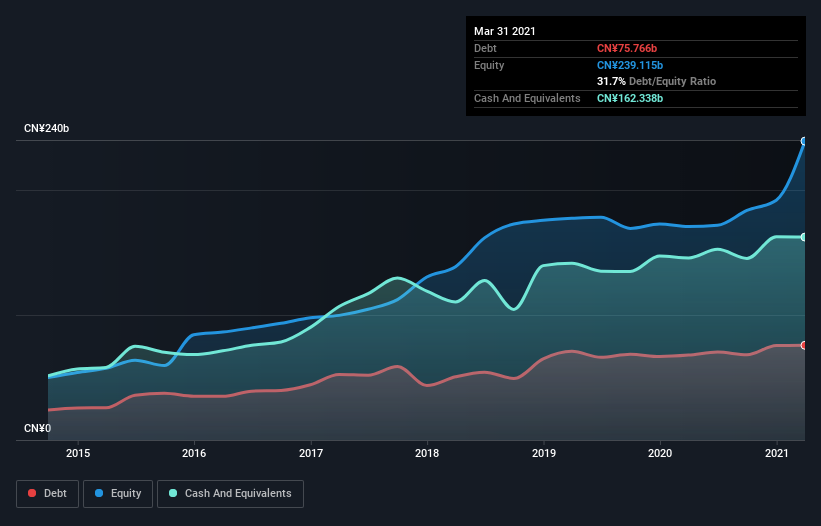Is Baidu (NASDAQ:BIDU) Using Too Much Debt?
The external fund manager backed by Berkshire Hathaway's Charlie Munger, Li Lu, makes no bones about it when he says 'The biggest investment risk is not the volatility of prices, but whether you will suffer a permanent loss of capital.' It's only natural to consider a company's balance sheet when you examine how risky it is, since debt is often involved when a business collapses. We note that Baidu, Inc. (NASDAQ:BIDU) does have debt on its balance sheet. But the real question is whether this debt is making the company risky.
When Is Debt Dangerous?
Debt and other liabilities become risky for a business when it cannot easily fulfill those obligations, either with free cash flow or by raising capital at an attractive price. Part and parcel of capitalism is the process of 'creative destruction' where failed businesses are mercilessly liquidated by their bankers. However, a more usual (but still expensive) situation is where a company must dilute shareholders at a cheap share price simply to get debt under control. Of course, the upside of debt is that it often represents cheap capital, especially when it replaces dilution in a company with the ability to reinvest at high rates of return. The first thing to do when considering how much debt a business uses is to look at its cash and debt together.
See our latest analysis for Baidu
What Is Baidu's Debt?
The image below, which you can click on for greater detail, shows that at March 2021 Baidu had debt of CN¥75.8b, up from CN¥67.9b in one year. However, it does have CN¥162.3b in cash offsetting this, leading to net cash of CN¥86.6b.
A Look At Baidu's Liabilities
We can see from the most recent balance sheet that Baidu had liabilities of CN¥66.9b falling due within a year, and liabilities of CN¥73.3b due beyond that. On the other hand, it had cash of CN¥162.3b and CN¥9.23b worth of receivables due within a year. So it actually has CN¥31.3b more liquid assets than total liabilities.
This surplus suggests that Baidu has a conservative balance sheet, and could probably eliminate its debt without much difficulty. Succinctly put, Baidu boasts net cash, so it's fair to say it does not have a heavy debt load!
Better yet, Baidu grew its EBIT by 160% last year, which is an impressive improvement. That boost will make it even easier to pay down debt going forward. The balance sheet is clearly the area to focus on when you are analysing debt. But it is future earnings, more than anything, that will determine Baidu's ability to maintain a healthy balance sheet going forward. So if you're focused on the future you can check out this free report showing analyst profit forecasts.
Finally, a company can only pay off debt with cold hard cash, not accounting profits. Baidu may have net cash on the balance sheet, but it is still interesting to look at how well the business converts its earnings before interest and tax (EBIT) to free cash flow, because that will influence both its need for, and its capacity to manage debt. Over the last three years, Baidu actually produced more free cash flow than EBIT. That sort of strong cash generation warms our hearts like a puppy in a bumblebee suit.
Summing up
While it is always sensible to investigate a company's debt, in this case Baidu has CN¥86.6b in net cash and a decent-looking balance sheet. The cherry on top was that in converted 105% of that EBIT to free cash flow, bringing in CN¥17b. So is Baidu's debt a risk? It doesn't seem so to us. There's no doubt that we learn most about debt from the balance sheet. But ultimately, every company can contain risks that exist outside of the balance sheet. For example, we've discovered 4 warning signs for Baidu (2 are potentially serious!) that you should be aware of before investing here.
At the end of the day, it's often better to focus on companies that are free from net debt. You can access our special list of such companies (all with a track record of profit growth). It's free.
This article by Simply Wall St is general in nature. It does not constitute a recommendation to buy or sell any stock, and does not take account of your objectives, or your financial situation. We aim to bring you long-term focused analysis driven by fundamental data. Note that our analysis may not factor in the latest price-sensitive company announcements or qualitative material. Simply Wall St has no position in any stocks mentioned.
Have feedback on this article? Concerned about the content? Get in touch with us directly. Alternatively, email editorial-team (at) simplywallst.com.

